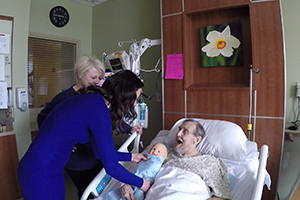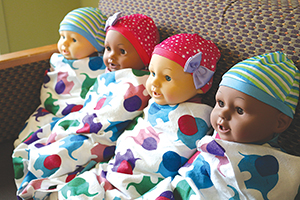Program director studying lifelike toys' impact on fall incidents
By JULIE MINDA
It can be a challenge for hospital staff to keep patients with advanced dementia secure and content. If patients are restless, disorientated or confused, and are unable to understand or follow instructions, it can be difficult for staff to ensure they don't try to get up out of bed unassisted.

Filipiak
This agitation can increase the risk of falls and other adverse events for patients with dementia, according to Angie Filipiak, director of women's services at SSM Health St. Clare Hospital in Fenton, Mo.
To help reduce the risk of accidents and to promote restful recovery, six SSM Health hospitals in Missouri are implementing a creative solution: They are offering lifelike baby dolls to patients with dementia.
According to information from SSM Health, the dolls "can bring a feeling of companionship, an improved sense of well-being and a decrease in negative emotions and agitation" for patients.
Filipiak is leading a study to determine whether the use of the dolls also decreases the risk of falls among patients with dementia.
She came up with the idea for the doll therapy program about two years ago. Formerly a pediatric nurse, she'd transferred to St. Clare to head an adult medical-surgical unit. She quickly realized what a challenge staff were having trying to keep surgical patients with dementia safe.

Angie Filipiak, foreground, and Aldijana Sacic of SSM Health St. Clare Hospital in Fenton, Mo., visit with Dieter Deuchler, who was given a comfort doll during his hospitalization in April 2018. Deuchler has since died. Filipiak founded SSM Health's doll therapy program. Both she and Sacic are nurses.
Courtesy of KTVI FOX 2
It was not uncommon, Filipiak says, for staff to give such patients simple tasks, such as folding towels, to focus the patients' minds so they'd be less likely to become disconcerted and try to get out of bed or a chair unassisted. In 2017, Filipiak and a colleague noticed that a patient with impaired cognition was cradling a towel as if it were a baby. The patient seemed to relax caring for her towel baby.
Filipiak's daughter had a brand-new spare doll at home and she brought that doll in to give to the patient.
But the patient was so content with the towel that Filipiak left the doll in her office. Several months later when another patient with dementia became extremely restless, Filipiak suggested the care team offer the patient the baby doll. "We were amazed how quickly it calmed her. She would talk to the doll, and this calmed her," Filipiak recalls.
The experience inspired Filipiak to launch the doll therapy program and a related research study on the dolls' impact on fall risk. She'd seen research — most of it conducted in long-term care settings — that indicated that doll therapy can reduce behavioral symptoms associated with dementia, but Filipiak hadn't seen anything on its impact on falls.
Filipiak bought lifelike baby dolls, with eyes that open and close. Her purchases included boy dolls and girl dolls and dolls representing a variety of races.

Baby dolls used in the doll therapy program at SSM Health St. Clare Hospital.
The program expanded to the emergency room and all inpatient units at St. Clare in October. The units try to keep three or four dolls on hand. The hospital auxiliaries and leadership at St. Clare and five additional participating SSM Health hospitals are providing most of the money to purchase the dolls.
The staff treats each doll as if it is a real baby — presenting the doll swaddled in a receiving blanket and patting the doll's back as they present it to the patient. "To see the response of the patient when they receive the doll — they light up with a sense of joy," Filipiak says. Many patients name their dolls.
Some patients keep the doll in their hospital bed. The dolls can go home with the patients upon discharge. (Dolls are not reused, due in part to infection control concerns.)
Filipiak's initial research in St. Clare's med-surg unit ran from March 2018 to May 2018. It involved 35 patients with dementia. Filipiak documented an 85 percent reduction in behavioral symptoms — including restlessness and agitation — after patients received the dolls.
To assess whether having a doll reduced fall risk, Filipiak pulled the fall reports on all patients with dementia who had been in the medical-surgical unit between March 2017 and May 2017. There were four falls recorded for that control group, but no falls involving the 35 patients who were given dolls.
The patients have a sense of purpose and serenity when caring for the dolls, Filipiak says. She says this is true whether or not the patients believe them to be dolls or real babies.
Filipiak recalls the experience of one patient with dementia who was hospitalized at St. Clare as she approached the end of her life. She was so restless she had to be kept in restraints. When given a doll, the patient became tranquil. She named the doll "Heidi" after one of her grandchildren. "The patient passed in the hospital peacefully unrestrained and the family was so appreciative — they were going to bury their mom with the doll," Filipiak says.
Filipiak now is heading a broader iteration of the study. She has engaged the six SSM Health hospitals in the doll therapy program in her research. Staff will observe and record the impact of the doll therapy on symptoms related to fall risk such as agitation and restlessness, attempts to get out of bed without assistance, and wandering.
"While other factors and interventions like bed/chair alarms and fall mats are utilized and essential to prevent falls and falls with injury in this patent population, the dolls are an additional intervention that will help reduce agitation, restlessness (and) wandering and provide more comfort, which will put these patients at a lower fall risk," says Filipiak.
The anecdotal results are positive so far, Filipiak says. Nurses like having "another tool in their toolbox" to use in response to behavioral symptoms, before they must resort to medications, or as a last choice, restraints. Medications can cause side effects that can increase fall risk, with the elderly especially prone to these side effects.
There now are some physicians at St. Clare who will not place an order for behavior control medications, such as antipsychotics or calming agents such as benzodiazepines, until the care team has tried doll therapy first with their geriatric patients with advanced dementia, she says.
Filipiak plans to develop a tool kit on how to roll out a doll therapy program, and she hopes to expand the program to other hospitals, even beyond SSM Health.
She welcomes inquiries at [email protected].